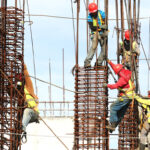These jobs also tend to have higher rates of turnover that result in unemployment, organizational restructuring, and volatility during the economic recession (Nakata, 2012). When workers experience high job strain, this exposure results in chronic or toxic psychosocial stress (Du & Leigh, 2018; Schnall et al., 2016; Ganster & Rosen, 2013). Multiple studies have found that job stress is related to adverse health outcomes, including coronary heart disease (Kivimaki & Kawachi, 2015; Sara et al., 2018), hypertension (Babu et al., 2014; Landsbergis et al., 2013), immune disorders that cause physiological dysregulation (Nakata, 2012), musculoskeletal disorders (van Rijn et al., 2010), poor mental health (Nieuwenhuijsen et al., 2010; Stansfeld & Candy, 2006), and adverse health behaviors (Schnall et al., 2016).
Toxic stress is especially high among day laborers (Martinez et al., 2015), home health aides (Karlsson et al., 2019), hotel housekeepers (Hsieh et al., 2016), and building cleaners (Eggerth et al., 2019). Most day laborers are undocumented Latino men uniquely vulnerable to job strain and psychosocial stress due to structural factors. Because they lack legal authorization to work, undocumented workers often fear losing their jobs or being deported and are often forced to endure poor working conditions or unfair pay (Moyce, 2018; Martinez et al., 2015). Home health aides, which include large proportions of people of color and immigrants, are also susceptible to job-related stress due to physical and verbal abuse from patients (Karlsson et al., 2019). Moreover, a higher rate of home health aides of color than White home health aides indicated experiencing discrimination, a particularly health-damaging form of toxic psychosocial stress (Jang et al., 2017). Among Latina hotel housekeepers, the demands of keeping up with a cleaning schedule along with the mistreatment of workers is a prominent source of stress (Hsieh et al., 2016), which is associated with high blood pressure, especially at the end of the day (Feaster & Krause, 2018). Building cleaners, predominantly Latina, also described job strain related to economic instability, excessive workload, dissatisfaction with management practices, and concerns related to workplace health and safety (Eggerth et al., 2019).
- Babu GR, Jotheeswaran AT, Mahapatra T, et al. Is hypertension associated with job strain? A meta-analysis of observational studies. Postgraduate Medical Journal. 2014;90(1065):402-409. https://oem.bmj.com/content/71/3/220.
- Du J, Leigh JP. Effects of Minimum Wages on Absence from Work Due to Illness. The BE Journal of Economic Analysis & Policy. 2018;18(1). https://ideas.repec.org/a/bpj/bejeap/v18y2018i1p23n5.html.
- Eggerth DE, Ortiz B, Keller BM, Flynn MA. Work experiences of Latino building cleaners: An exploratory study. American Journal of Industrial Medicine. 2019;62(7):600-608. https://www.ncbi.nlm.nih.gov/pmc/articles/PMC7197437/.
- Feaster M, Krause N. Job strain associated with increases in ambulatory blood and pulse pressure during and after work hours among female hotel room cleaners. American Journal of Industrial Medicine. 2018;61(6):492-503. https://onlinelibrary.wiley.com/doi/full/10.1002/ajim.22837.
- Ganster DC, Rosen CC. Work Stress and Employee Health: A Multidisciplinary Review. Journal of Management. 2013;39(5):1085-1122. https://journals.sagepub.com/doi/10.1177/0149206313475815.
- Hsieh Y-C, Apostolopoulos Y, Sönmez S. Work Conditions and Health and Well-Being of Latina Hotel Housekeepers. Journal of Immigrant and Minority Health. 2016;18(3):568-581. https://link.springer.com/article/10.1007/s10903-015-0224-y.
- Jang Y, Lee AA, Zadrozny M, Bae S-H, Kim MT, Marti NC. Determinants of Job Satisfaction and Turnover Intent in Home Health Workers: The Role of Job Demands and Resources. J Appl Gerontol. 2017;36(1):56-70. https://journals.sagepub.com/doi/10.1177/0733464815586059.
- Karlsson ND, Markkanen PK, Kriebel D, et al. Home care aides’ experiences of verbal abuse: a survey of characteristics and risk factors. Occup Environ Med. 2019;76(7):448-454. https://oem.bmj.com/content/76/7/448.long.
- Kivimäki M, Kawachi I. Work Stress as a Risk Factor for Cardiovascular Disease. Curr Cardiol Rep. 2015;17(9):74. doi:10.1007/s11886-015-0630-8. https://www.ncbi.nlm.nih.gov/pmc/articles/PMC4523692/.
- Landsbergis PA, Dobson M, Koutsouras G, Schnall P. Job Strain and Ambulatory Blood Pressure: A Meta-Analysis and Systematic Review. American Journal of Public Health. 2013;103(3):E61-E71. https://www.ncbi.nlm.nih.gov/pmc/articles/PMC3673518/.
- Martínez AD, Piedramartel A, Agnew J. Going Beyond the Injury: Regulatory Conditions Contributing to Latina/o Immigrants’ Occupational Psychosocial Stressors. Front Public Health. 2015;3. https://www.ncbi.nlm.nih.gov/pmc/articles/PMC4611963/.
- Moyce SC, Schenker M. Migrant Workers and Their Occupational Health and Safety. Annual Review of Public Health. 2018;39(1):351-365. https://www.annualreviews.org/doi/abs/10.1146/annurev-publhealth-040617-013714.
- Nakata A. Psychosocial Job Stress and Immunity: A Systematic Review. In: Yan Q, ed. Psychoneuroimmunology: Methods and Protocols. Methods in Molecular Biology. Humana Press; 2012:39-75. https://link.springer.com/protocol/10.1007/978-1-62703-071-7_3.
- Nieuwenhuijsen K, Bruinvels D, Frings-Dresen M. Psychosocial work environment and stress-related disorders, a systematic review. Occupational Medicine. 2010;60(4):277-286. https://academic.oup.com/occmed/article/60/4/277/1392515.
- Sara JD, Prasad M, Eleid MF, Zhang M, Widmer RJ, Lerman A. Association Between Work‐Related Stress and Coronary Heart Disease: A Review of Prospective Studies Through the Job Strain, Effort‐Reward Balance, and Organizational Justice Models. J Am Heart Assoc. 2018;7(9) : e008073. doi:10.1161/JAHA.117.008073. https://www.ncbi.nlm.nih.gov/pmc/articles/PMC6015274/.
- Schnall PL, Dobson M, Landsbergis P. Globalization, Work, and Cardiovascular Disease. Int J Health Serv. 2016;46(4):656-692. doi:10.1177/0020731416664687. https://journals.sagepub.com/doi/10.1177/0020731416664687.
- Stansfeld S, Candy B. Psychosocial work environment and mental health—a meta-analytic review. Scandinavian Journal of Work, Environment & Health. 2006;32(6):443-462. https://www.sjweh.fi/article/1050.
- van Rijn RM, Huisstede BM, Koes BW, Burdorf A. Associations between work-related factors and specific disorders of the shoulder — a systematic review of the literature. Scandinavian Journal of Work, Environment & Health. 2010;36(3):189-201. https://www.sjweh.fi/article/2895.





